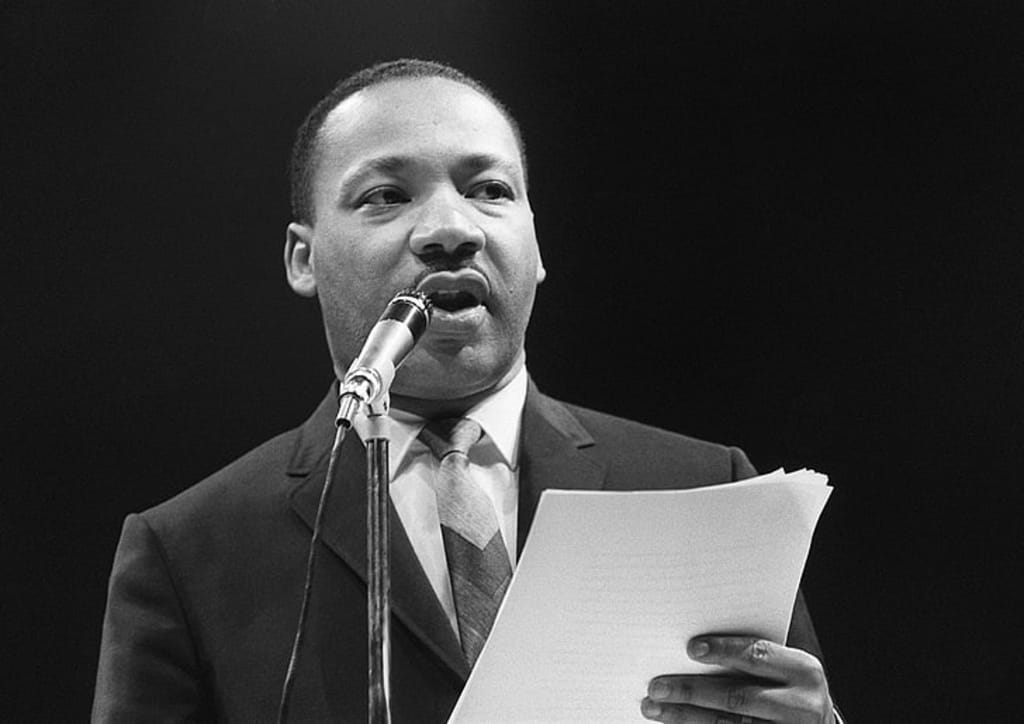The History of Martin Luther King, Jr.
Why Martin Luther King Day is so important

This was originally written on January 21, 2019, when I was still in high school, and has been edited slightly for clarity.
Today is Martin Luther King Jr. Day. I have a strong feeling most students today are probably excited about this day because they get a day off from school, myself admittedly included. However, if nothing else, we should at least take the time today to acknowledge the great man this day is celebrating and all the amazing things he did for civil rights and activism. He was born Michael Luther King Jr. on January 15, 1929. His grandfather served as a pastor of the Ebenezer Baptist Church in Atlanta, Georgia from 1914 to 1931. His father took over the position for four decades, and Martin Jr. himself served as co-pastor from 1960 until his death. He graduated from a segregated high school at the age of fifteen, earned a B.A. degree at Morehouse College, and was awarded another B.A. at Crozer Theological Seminary after three years of study, where he was elected president of a predominantly white senior class. Afterward, he enrolled at Boston University and earned his doctorate in 1953. While living in Boston, he met Coretta Scott, whom he would also marry there and eventually birth two sons and two daughters with. In 1954, he became pastor of the Montgomery Dexter Avenue Baptist Church, and in 1955, already a leader of the NAACP, he accepted the leadership of a 382-day long bus boycott, during which time he was arrested and subjected to personal abuse, along with his house being bombed. In December 1956, segregation on public buses was deemed unconstitutional.
In 1957, Luther was appointed the leader of the Southern Christian Leadership Conference, which was to provide new leadership for the approaching civil rights movement. From 1957 to 1968, he traveled six million miles across the country, speaking over twenty-five hundred times where there was injustice and protest. He wrote five books and numerous articles. He led a massive protest from Birmingham, Alabama, planned drives to allow African-Americans in Alabama to vote, and directed a peaceful march on Washington D.C. in which over 250,000 people participated. It was during this march that he delivered the “I Have A Dream” speech, one of the most iconic speeches in American history, wishing for a future in which segregation does not exist. He campaigned for Lyndon B. Johnson, he was arrested around twenty times and assaulted at least four times, he was named Time’s Man of the Year in 1963, and was awarded five honorary degrees. At the age of thirty-five, Martin Luther won the Nobel Peace Prize, the youngest man in history to receive it. He was notified that he had received the prize and a cash prize of $54,123 dollars, which he donated to furthering the civil rights movement in America.
On April 4, 1968, standing on a balcony outside of his hotel in Memphis, Tennessee, where he was supposed to lead a protest march later that day, King was tragically assassinated. He was rushed to a hospital and pronounced dead an hour later at the age of only 39. On June 8, police apprehended the subject, James Earl Ray, and on March 8, 1969, Ray pleaded guilty to the assassination of King and was sentenced to 99 years in prison. The impact that Martin Luther King, Jr. had on civil rights cannot be understated. He was an influential person in inspiring people to stand up for what they believed was right and encouraged people to protest using words, not violence or hate. His speeches touched people across the country and gave them hope in a time where there seemed like there was none. Martin Luther King, Jr. still has a lasting impact on us today, and his speeches still inspire us, touch us, and give us hope 50 years after they were spoken. If you have the time today, on this federal holiday which was designated as such by the Federal Government only in 1994, take the time to appreciate the man whom this day was for, and the impact he has had on generations of people across the country and across the world.
Sources
The Assassination of MLK Jr. by History.com
MLK's Nobel Peace Prize Biography
MLK Sr's. Wikipedia page (look at sources for information checking)





Comments
There are no comments for this story
Be the first to respond and start the conversation.